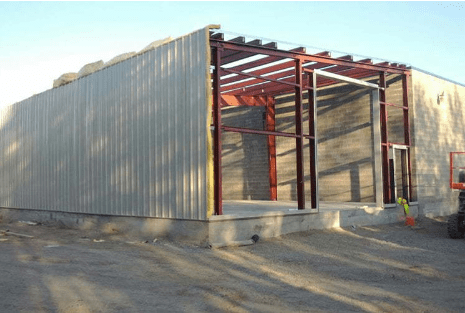Steel frame agricultural buildings are transforming the landscape of modern farming. With their unmatched durability and sustainability, these structures are not just a trend—they’re a smart investment for the future. Unlike traditional wooden barns, steel frames offer superior strength, resisting the harshest weather conditions and reducing long-term maintenance costs.
You’re likely considering the environmental impact of your farming operations. Steel frame buildings excel here too. They’re highly recyclable, reducing waste and supporting sustainable practices. Plus, their longevity means fewer resources are needed for repairs and replacements, making them an eco-friendly choice. Discover why steel frame agricultural buildings are becoming the backbone of sustainable farming in the UK.
Overview of Steel Frame Agricultural Buildings
Steel frame agricultural buildings are transforming the farming landscape. These structures provide resilience you won’t find in traditional barns. Their design offers a blend of strength and environmental benefits.
Characteristics of Steel Frames
Steel frames possess unique attributes that make them ideal for agriculture. They are known for robustness and longevity. Steel doesn’t warp or rot, which solves common issues faced with wood.
How often do you wonder about maintenance? It’s minimal with steel. This material resists pests and requires less upkeep. Steel frames also support wide spans without internal columns, giving you more usable space.
Have you considered the environmental impact? Steel frames are highly recyclable. Their production involves less waste, aligning with sustainable practices.
Benefits for Agriculture
Steel frame buildings offer numerous advantages to the agricultural sector. They provide strong resistance to harsh weather. Think about the storms your farm faces; steel withstands them better than wood.
Have you calculated long-term maintenance costs? Steel frames reduce these expenses. Less frequent repairs save both time and money. Look at how you use space. Steel frames allow flexible designs. Need large, open areas for machinery or livestock? Steel accommodates.
Finally, steel supports sustainability. These buildings contribute to eco-friendly farming. You reduce waste and can rely on a recyclable material. Steel frame agricultural buildings stand as a beacon of modern, resilient, and sustainable farming.
Durability of Steel Frame Agricultural Buildings
Steel frame agricultural buildings stand out for their exceptional lifespan. They provide a sturdy and long-lasting solution for modern farming needs.
Factors Affecting Durability
Several factors influence the durability of steel frame agricultural buildings. The quality of the steel used plays a significant role. High-grade steel, resistant to corrosion, ensures the structure remains intact for decades. Environmental conditions around the building also matter. Frequent exposure to moisture and chemicals can reduce the lifespan of steel unless suitable protective coatings are applied.
Design elements are crucial too. Proper load distribution and structural integrity prevent warping or weakening over time. You must also consider local weather patterns. Strong winds and heavy snow can impact longevity, especially if the structural design isn’t optimised for these conditions. Keep an eye on the foundation. A solid base made from quality materials ensures the structure stands strong for years.
Maintenance Tips for Longevity
Maintaining steel frame agricultural buildings ensures they last longer. Regular inspections help identify and address potential issues early. Look for signs of corrosion, and if any is found, clean and recoat the affected areas. This simple step keeps the steel protected from the elements. Make sure rainwater drainage systems are effective. Water accumulation can lead to rust over time. Clear the gutters and downpipes annually to prevent blockages.
Lubricate moving parts such as doors and windows. This prevents rust and ensures smooth operation. It’s essential to wash the building exterior occasionally. Removing dust and grime maintains the integrity of the protective coatings. When any structural damage is spotted, repair it promptly. Ignoring small issues can lead to significant problems down the line.
Sustainability Aspects
Steel frame agricultural buildings provide numerous environmental benefits. Think about the reduced deforestation with steel compared to traditional wooden structures. Steel production might involve energy, but it’s balanced by its long-lasting nature. A steel frame building can reduce the overall footprint of your farming operations.
Consider also the minimal waste associated with steel construction. Components are pre-cut and manufactured to exact specifications, leaving little room for surplus. Using fewer materials translates to fewer resources. Steel frames also have superior energy efficiency. They support better insulation reducing your heating and cooling needs, resulting in lower energy consumption.
Recycling and Reusability of Steel
Steel’s recyclability is one of its standout features. You might not realise it, but most steel products contain some recycled material. This means when the usefulness of a steel frame ends, it transitions seamlessly into new forms.
How many materials can you say will do that? The steel from a dismantled building can re-enter the production cycle with minimal loss of quality. Compare this to other building materials that often end up in landfills. Steel’s ability to be melted down and repurposed makes it an environmental powerhouse.
Think about the lifecycle of the materials used in your structures. Steel can serve repeatedly in various forms over time. This means fewer new resources will be needed for future constructions. Not only does this reduce environmental strain, but it also enhances the sustainability of your farming practices.
Technological Advancements
Recent innovations in steel framing transform agricultural buildings. Advanced coatings protect steel from corrosion, extending the lifespan of structures. These coatings are efficient and low maintenance, relying on modern chemistry.
New steel alloys enhance the strength and flexibility of frames, improving resilience under heavy loads and adverse weather. These materials resist wear, reducing the frequency of repairs. Do you think older materials can match this efficiency?
Manufacturing processes have also evolved. Precision engineering ensures frames fit together perfectly, eliminating gaps and weaknesses. Automated welding machines increase the speed and consistency of construction, ensuring a strong and secure foundation.
Impact on Durability and Sustainability
Enhanced durability and sustainability stem directly from these technological advances. Modern coatings prevent rust, ensuring buildings stand strong against the elements and minimising maintenance. How much time and money could you save?
The new steel alloys, by nature, last longer and withstand more stress than traditional materials. This durability means less frequent replacement and repair, leading to economic and environmental benefits. It’s clear that durability equals sustainability.
Efficient manufacturing reduces waste, aligning with sustainable practices. Precision engineering cuts down on errors, resulting in fewer discarded materials. In what ways could this efficiency transform your operations?
Steel’s recyclability exemplifies sustainability. When buildings reach their end, steel components recycle easily, re-entering the supply chain and reducing raw material consumption. This closed loop not only conserves resources but also minimises landfill.
Each advance in steel framing technology bolsters the case for steel agricultural buildings. By focusing on durability and sustainability, these innovations make steel the cornerstone of modern and future farming practices.
In Closing
Steel frame agricultural buildings are setting new standards in farming with their unparalleled durability and sustainability. The latest technological advancements enhance their strength and longevity while also promoting environmentally friendly practices. By choosing steel, you’re investing in a future-proof solution that supports efficient and sustainable agricultural operations. Embrace the benefits of steel to ensure your farming practices are both resilient and eco-friendly.



